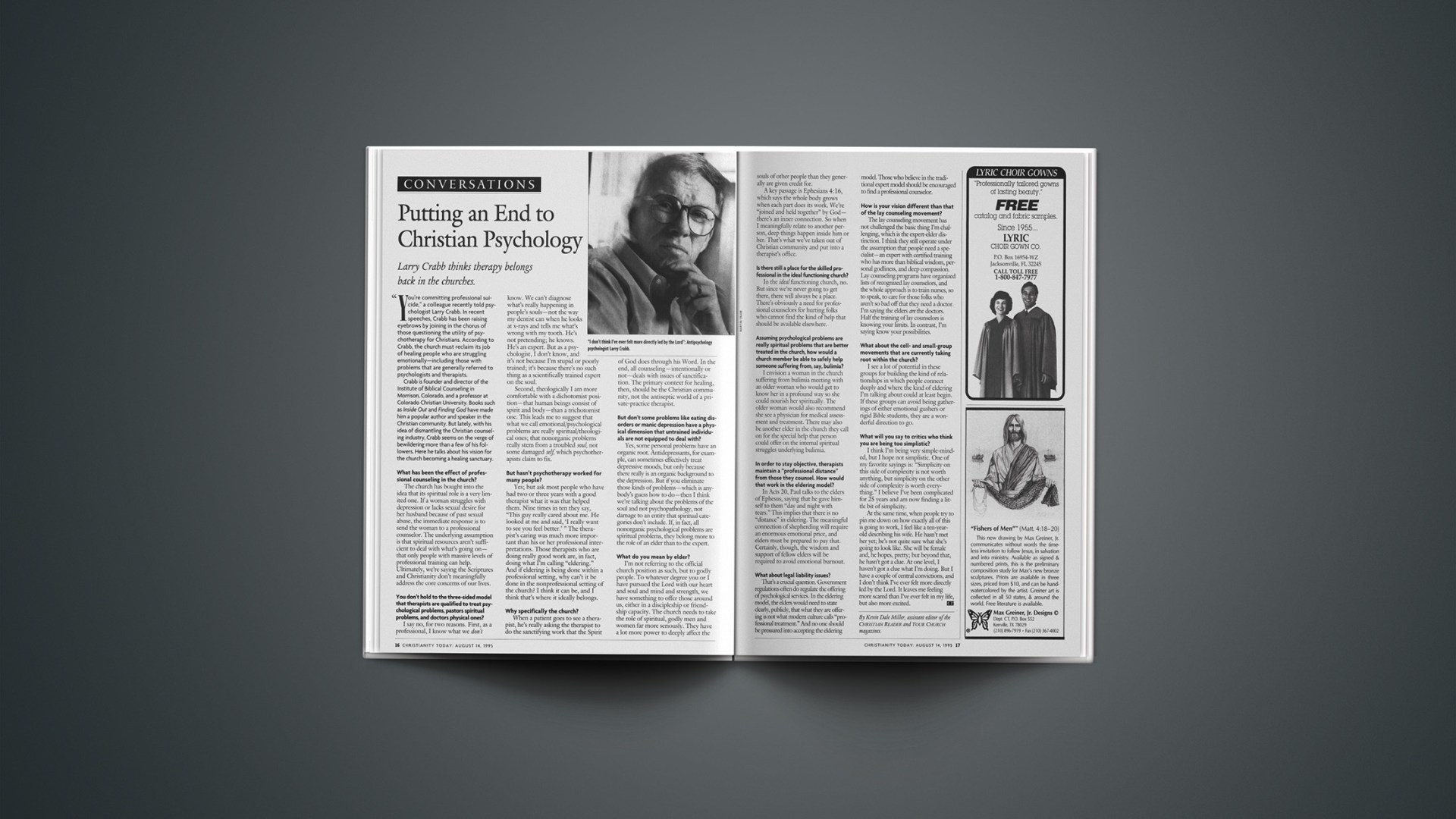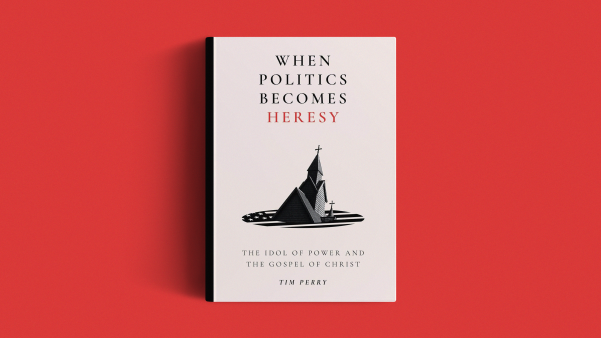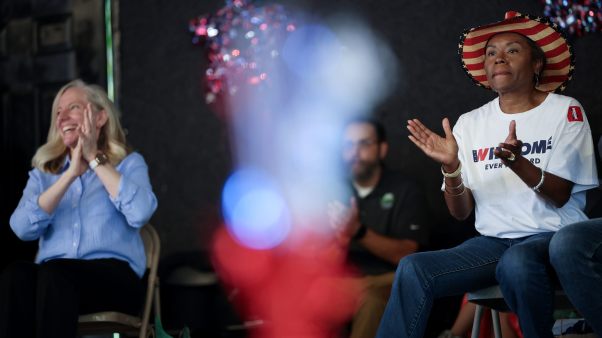Putting an End to Christian Psychology
“You’re committing professional suicide,” a colleague recently told psychologist Larry Crabb. In recent speeches, Crabb has been raising eyebrows by joining in the chorus of those questioning the utility of psychotherapy for Christians. According to Crabb, the church must reclaim its job of healing people who are struggling emotionally-including those with problems that are generally referred to psychologists and therapists.
Crabb is founder and director of the Institute of Biblical Counseling in Morrison, Colorado, and a professor at Colorado Christian University. Books such as Inside Out and Finding God have made him a popular author and speaker in the Christian community. But lately, with his idea of dismantling the Christian counseling industry, Crabb seems on the verge of bewildering more than a few of his followers. Here he talks about his vision for the church becoming a healing sanctuary.
What has been the effect of professional counseling in the church?
The church has bought into the idea that its spiritual role is a very limited one. If a woman struggles with depression or lacks sexual desire for her husband because of past sexual abuse, the immediate response is to send the woman to a professional counselor. The underlying assumption is that spiritual resources aren’t sufficient to deal with what’s going on-that only people with massive levels of professional training can help. Ultimately, we’re saying the Scriptures and Christianity don’t meaningfully address the core concerns of our lives.
You don’t hold to the three-sided model that therapists are qualified to treat psychological problems, pastors spiritual problems, and doctors physical ones?
I say no, for two reasons. First, as a professional, I know what we don’t know. We can’t diagnose what’s really happening in people’s souls-not the way my dentist can when he looks at x-rays and tells me what’s wrong with my tooth. He’s not pretending; he knows. He’s an expert. But as a psychologist, I don’t know, and it’s not because I’m stupid or poorly trained; it’s because there’s no such thing as a scientifically trained expert on the soul.
Second, theologically I am more comfortable with a dichotomist position-that human beings consist of spirit and body-than a trichotomist one. This leads me to suggest that what we call emotional/psychological problems are really spiritual/theological ones; that nonorganic problems really stem from a troubled soul, not some damaged self, which psychotherapists claim to fix.
But hasn’t psychotherapy worked for many people?
Yes; but ask most people who have had two or three years with a good therapist what it was that helped them. Nine times in ten they say, “This guy really cared about me. He looked at me and said, ‘I really want to see you feel better.’ ” The therapist’s caring was much more important than his or her professional interpretations. Those therapists who are doing really good work are, in fact, doing what I’m calling “eldering.” And if eldering is being done within a professional setting, why can’t it be done in the nonprofessional setting of the church? I think it can be, and I think that’s where it ideally belongs.
Why specifically the church?
When a patient goes to see a therapist, he’s really asking the therapist to do the sanctifying work that the Spirit of God does through his Word. In the end, all counseling-intentionally or not-deals with issues of sanctification. The primary context for healing, then, should be the Christian community, not the antiseptic world of a private-practice therapist.
But don’t some problems like eating disorders or manic depression have a physical dimension that untrained individuals are not equipped to deal with?
Yes, some personal problems have an organic root. Antidepressants, for example, can sometimes effectively treat depressive moods, but only because there really is an organic background to the depression. But if you eliminate those kinds of problems-which is anybody’s guess how to do-then I think we’re talking about the problems of the soul and not psychopathology, not damage to an entity that spiritual categories don’t include. If, in fact, all nonorganic psychological problems are spiritual problems, they belong more to the role of an elder than to the expert.
What do you mean by elder?
I’m not referring to the official church position as such, but to godly people. To whatever degree you or I have pursued the Lord with our heart and soul and mind and strength, we have something to offer those around us, either in a discipleship or friendship capacity. The church needs to take the role of spiritual, godly men and women far more seriously. They have a lot more power to deeply affect the souls of other people than they generally are given credit for.
A key passage is Ephesians 4:16, which says the whole body grows when each part does its work. We’re “joined and held together” by God-there’s an inner connection. So when I meaningfully relate to another person, deep things happen inside him or her. That’s what we’ve taken out of Christian community and put into a therapist’s office.
Is there still a place for the skilled professional in the ideal functioning church?
In the ideal functioning church, no. But since we’re never going to get there, there will always be a place. There’s obviously a need for professional counselors for hurting folks who cannot find the kind of help that should be available elsewhere.
Assuming psychological problems are really spiritual problems that are better treated in the church, how would a church member be able to safely help someone suffering from, say, bulimia?
I envision a woman in the church suffering from bulimia meeting with an older woman who would get to know her in a profound way so she could nourish her spiritually. The older woman would also recommend she see a physician for medical assessment and treatment. There may also be another elder in the church they call on for the special help that person could offer on the internal spiritual struggles underlying bulimia.
In order to stay objective, therapists maintain a “professional distance” from those they counsel. How would that work in the eldering model?
In Acts 20, Paul talks to the elders of Ephesus, saying that he gave himself to them “day and night with tears.” This implies that there is no “distance” in eldering. The meaningful connection of shepherding will require an enormous emotional price, and elders must be prepared to pay that. Certainly, though, the wisdom and support of fellow elders will be required to avoid emotional burnout.
What about legal liability issues?
That’s a crucial question. Government regulations often do regulate the offering of psychological services. In the eldering model, the elders would need to state clearly, publicly, that what they are offering is not what modern culture calls “professional treatment.” And no one should be pressured into accepting the eldering model. Those who believe in the traditional expert model should be encouraged to find a professional counselor.
How is your vision different than that of the lay counseling movement?
The lay counseling movement has not challenged the basic thing I’m challenging, which is the expert-elder distinction. I think they still operate under the assumption that people need a specialist-an expert with certified training who has more than biblical wisdom, personal godliness, and deep compassion. Lay counseling programs have organized lists of recognized lay counselors, and the whole approach is to train nurses, so to speak, to care for those folks who aren’t so bad off that they need a doctor. I’m saying the elders are the doctors. Half the training of lay counselors is knowing your limits. In contrast, I’m saying know your possibilities.
What about the cell- and small-group movements that are currently taking root within the church?
I see a lot of potential in these groups for building the kind of relationships in which people connect deeply and where the kind of eldering I’m talking about could at least begin. If these groups can avoid being gatherings of either emotional gushers or rigid Bible students, they are a wonderful direction to go.
What will you say to critics who think you are being too simplistic?
I think I’m being very simple-minded, but I hope not simplistic. One of my favorite sayings is: “Simplicity on this side of complexity is not worth anything, but simplicity on the other side of complexity is worth everything.” I believe I’ve been complicated for 25 years and am now finding a little bit of simplicity.
At the same time, when people try to pin me down on how exactly all of this is going to work, I feel like a ten-year-old describing his wife. He hasn’t met her yet; he’s not quite sure what she’s going to look like. She will be female and, he hopes, pretty; but beyond that, he hasn’t got a clue. At one level, I haven’t got a clue what I’m doing. But I have a couple of central convictions, and I don’t think I’ve ever felt more directly led by the Lord. It leaves me feeling more scared than I’ve ever felt in my life, but also more excited.
By Kevin Dale Miller, assistant editor of the Christian Reader and Your Church magazines.
Copyright © 1995 Christianity Today. Click for reprint information.
ctcurrtk5T90165814










